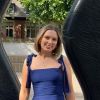
Alice Spall
- Course: MA Political Communication
- Graduation: 2021
- Nationality: British
- Job title: TV Producer
- Company: Sky News
Tell us a bit about yourself.
While growing up, I loved playing around with cameras and editing software, eventually making youtube videos and short films about anything that captured my interest. As I got older, I found an interest in politics through my parents and got involved in local politics, before studying it at university. I eventually realised that I was much more passionate about telling political stories than being involved in them and decided to pursue a career in journalism.
What have you been doing since finishing your studies? What are you doing in terms of your career?
While studying for my masters I gained work experience in journalism by volunteering at my local radio station, and getting involved in LSTV, LSR and the Gryphon.
After I graduated, I started applying for entry level jobs in news, and eventually got offered freelance shifts working as a text producer at Sky News. Text producing involved creating live on-screen graphics and controlling the ticker and text seen on screen – a high pressure but highly rewarding job. After covering some massive events, such as covid briefings, Partygate and the start of the Ukraine war, I was offered a full-time job at Sky. I did that job for a year, before moving to be an output producer on the breakfast show.
What company are you working for, what is your role, and what does it involve?
I am currently an output producer for the Early Rundown and Breakfast show on Sky News. The role varies massively from day to day, but here are some of the elements of the job:
• Writing questions and briefs for the presenters on the guests we have on the show –ranging from members of cabinet, to victims of war, to boybands.
• Booking guests to react to live breaking news during the show
• Greeting guests and preparing them for the show
• Writing, editing and producing packages
• Liaising with correspondents to research and produce segments
• Outputting the programme from the gallery – working directly with the directors and presenters
• Working on location during live outside broadcasts
What experiences at Leeds do you think have particularly helped with your career?
LSTV gave me so much experience with being on a live set and having creative control over a show. Particularly, working on the U.S. election special. Nowhere else can you get to practice with the equipment that is used on tv sets, and practice producing and presenting during a live event.
Writing news articles and news bulletins at the Gryffon and LSR also helped refine my news judgement and writing skills.
Why did you choose to study your particular course? Why did you choose the University of Leeds?
I chose my course because I wanted to study journalism and media without giving up studying politics, which I loved. My course allowed me to take other modules in the School of Media and Communication so I could adapt my degree to what I wanted to study.
I chose Leeds because it has a great School of Media and Communication, and I heard it was a great university city.
What aspects of the course did you enjoy the most?
I really enjoyed creating our own political communication campaign to get disenfranchised voters involved in local politics. It was great to get some hands-on experience.
What activities outside of your studies were you involved in?
LSTV, LSR and the Gryffon.
What would you say to students thinking about studying your course?
Get as much hands-on experience as you can. Throw yourself into extracurriculars and make as many connections as possible.

